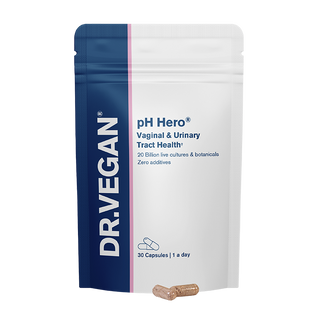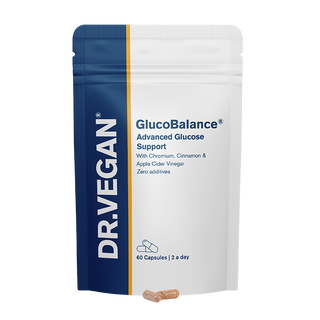The link between yeast infections and diabetes

By: Shona Wilkinson
Yeast infections and diabetes are two health concerns that seem unrelated but are actually more intertwined than you would think. Women with diabetes have a higher risk of developing yeast infections than those without. We explain the common causes, signs and prevention tips for yeast infections and reveal the intriguing connection between yeast infections and diabetes.
The latest vaginal health research by DR.VEGAN® revealed that one-third of the women experienced vaginal infections such as bacterial vaginosis (BV), urinary tract infections (UTIs), or thrush, with over 10% dealing with these issues daily. Continue reading the research.
What are yeast infections?
Yeast infections, also known as candidiasis, are fungal infections caused by the overgrowth of the Candida yeast species. Candida is naturally present in small amounts in the body, but various factors can cause an imbalance, leading to an infection.
Common causes
- Poor diet
- Stress
- A weakened immune system
- Antibiotic use
- Hormonal changes
- Warm, moist environments
What's your diet missing? Create your free Diet Profile.
Symptoms
Yeast infections can manifest in various ways, depending on the affected area. Common signs include:
- Itching
- Burning
- Redness
- Discomfort
- Thick, white discharge from the vagina
One particularly notable form of yeast infection is oral or vaginal thrush, which affects the mouth, throat and vagina. It appears as white patches on the tongue, inner cheeks, roof of the mouth and vagina. Thrush is often seen in infants, older adults and individuals with compromised immune systems.
Discover the difference between yeast infections and urinary tract infections. You may also be interested in learning about Bacterial vaginosis (BV), a common vaginal infection affecting approximately 30% of women at some point in their lives.
The connection to diabetes
Research has unveiled a strong connection between yeast infections and diabetes. People with diabetes, particularly uncontrolled or poorly managed diabetes, have a higher risk of developing yeast infections. The relationship lies in elevated blood sugar levels. Yeast thrives on sugar and excess glucose in the bloodstream provides an ideal environment for yeast to multiply rapidly. Studies have shown that yeast infections are more than twice as common in people with diabetes compared to those without the condition.
You may also be interested in 'Exploring the link between diabetes & early menopause'.
Does the type of diabetes make a difference?
While the connection between yeast infections and diabetes applies to type 1 and type 2 diabetes, the risk is often more pronounced in individuals with uncontrolled blood sugar levels. Proper diabetes management, including monitoring blood sugar and following a balanced diet, can help mitigate the risk of yeast infections.
What is sugar's role in yeast infections?
The link between sugar and yeast infections extends beyond diabetes. Consuming excessive amounts of sugar can promote yeast overgrowth, creating an environment conducive to infections. While cutting out all sugar is neither necessary nor advisable, moderation is key to preventing an overgrowth of candida. You may be interested in reading the role of nutrition in vaginal and bladder health.
Tip: Ensure you look out for plant-sweeteners, such as stevia, stevia derivatives and xylitol, which are up to 350x sweeter than sugar and can have just as serious health consequences as sugar, as highlighted by the WHO.
Can yeast infections have an impact on blood sugar?
Interestingly, the relationship between yeast infections and diabetes isn't entirely one-sided. Severe yeast infections, especially when widespread, can increase blood sugar levels. The body's immune response to the infection can lead to insulin resistance, making it harder to control blood sugar.
Preventing yeast infections
- Maintain proper diabetes management: Keeping blood sugar levels within a healthy range is crucial to reducing the risk of yeast infections. GlucoBalance® is the most comprehensive plant-based formula for managing blood glucose levels, protecting against the highs and lows of blood sugar levels and your insulin function.
- Eat a diet low in processed foods and refined sugars: Minimising blood sugar spikes with whole, unprocessed food is a great way to decrease risk.
- Practice good hygiene: Keep the affected areas clean and dry, particularly in warm, moist areas prone to yeast growth.
- Choose breathable fabrics: Opt for cotton underwear and breathable clothing to minimise moisture accumulation.
- Avoid harsh soaps and douches: Use mild, fragrance-free products to cleanse intimate areas, avoiding disruption of the natural balance.
- Probiotics and supplements: Only 29% of the women surveyed in our latest research currently take a probiotic to support their vaginal health, despite the significant connection between the gut microbiome and the vagina. Probiotics, like pH Hero®, an advanced natural formula of clinically studied probiotics and botanicals for vaginal flora, can help maintain a healthy microbial balance against candida in the digestive tract and the vagina. 77%* of customers find pH Hero® effective and 90% feel the difference within 8 weeks. The most common signs pH Hero® was found to address include: itchiness, dryness, thrush, UTIs and frequent urination.
The connection between yeast infections and diabetes is a reminder that one health condition can influence another. By understanding these relationships and taking proactive steps to manage diabetes and promote good hygiene, you can reduce the risk of yeast infections and ensure better overall wellbeing.
You may also enjoy reading:
- What colour should your urine be?
- What is vaginal atrophy?
- What is period poo?
- The surprising life impacts of PMS
- What PMS type are you?
- Nutrition for PMS
*Based on a UK survey conducted by DR.VEGAN® of 68 customers, nationally representative, during May 2024. All customer survey findings reflect our own efforts and have not been influenced or verified by any external organisations or third-party entities.
Discover our range of award-winning vegan probiotics, vitamins and supplements.
Want to hear more from our nutritionists? Sign up to our email newsletter for insights and exclusive offers:



















